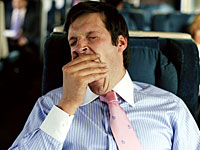
Is one of your favorite sayings “I'll sleep when I'm dead"? You may
want to reconsider. Far from being a time-wasting, 8-hour sentence in a useless
void, the research is pretty clear on this point: sleep is crucial for good
health. It helps memory and mood, keeps you trim, strengthens your immune
system, fights inflammation, and keeps your heart and blood vessels in tip-top
shape.
"When you're sleeping you're regulating hormone levels, you're
regulating insulin levels, your blood pressure is being kept under control,
there are a lot of things going on, and if you're not getting enough sleep
you're throwing these things out of whack," says Shelby Freedman Harris,
PsyD, director of behavioral sleep medicine at Montefiore Medical Center’s
Sleep-Wake Disorders Center in New York City.
While you're snoozing, the body repairs damaged tissue, produces crucial
hormones, and strengthens memories—a process called consolidation, which helps
you perform a new skill better after sleeping than you would if you spent an
equivalent amount of time awake. (Take that, all-nighters!)
"It's a way for the body to integrate everything that happened over
the past waking day and to kind of prepare for the next day," says Virend
K. Somers, MD, a professor of medicine and cardiovascular diseases at the Mayo
Clinic in Rochester, Minn., who studies sleep and heart health.
Hopefully, you're convinced that sleep is good for you. So what happens
when age-old culprits like insomnia or sleep apnea—or newer ones like a
jam-packed schedule—cause you to chronically lose sleep? That's right, they may
affect your health—particularly your heart. (In general, short stretches of
sleep deprivation—when taking care of a new baby, for example—can be
challenging, but aren't thought to have a long-term effect on health).
Why your heart needs a good night's sleep
Short sleepers, typically defined as people who get less than six hours
of sleep a night, as well as people who don't spend enough time in the deepest
stages of sleep, are at higher risk of heart attacks and strokes than those who
get at least seven hours.
A 2011 study in male Japanese factory workers found those who slept less
than six hours a night had a five-fold increased heart attack risk over a
14-year span compared with those who logged between 7 and 8 hours a night.
Another published in 2011 found that healthy men 65 and older with normal blood
pressure were nearly twice as likely to develop hypertension during the study
if they spent less time in the deepest sleep stage (known as slow-wave sleep)
compared with those who spent the most time deeply asleep.
There's also some limited evidence that short-term sleep deprivation may
be harmful to those with heart problems. In 2012, Swedish researchers reported
that hospital admissions for heart attacks increased by about 4% in the week
after the spring transition to daylight saving time compared to other weeks.
This is when we “spring forward" and set our clocks an hour ahead—meaning
many of us lose an hour of sleep.
It’s not clear why sleep may affect the heart, or if there is some
unidentified factor that affects your cardiovascular system and ability to
sleep. But one nighttime problem is a known heart hazard—sleep apnea. People
who have sleep apnea tend to snore and have upper airway collapse during sleep.
This causes them to snort and gasp for breath, without really waking up enough
to be aware of it.
"It's as if somebody's choking you, so your heart rate goes up,
your blood pressure goes up, and instead of having a daily cycle in which
everything slows down at night, instead everything is higher during the
night," says Charles Czeisler, MD, the Baldino Professor of Sleep Medicine
at Harvard Medical School in Boston. "Over time, even your daytime blood
pressure is higher." In fact, he adds, many experts think sleep apnea may
account for one-third of all cases of high blood pressure among adults.
If you're not feeling rested during the day and your bed partner says
you snore, you should ask your doctor about sleep apnea. "There’s enough
evidence out there suggesting that sleep apnea is bad that people need to take
it seriously," Dr. Somers says.
People with less severe sleep apnea may be able to get their symptoms
under control by just adopting strategies that prevent them from sleeping on
their back, for example sewing a tennis ball into the front pocket of a T-shirt
and wearing it backwards, Harris says. There are even shirts that you can buy
with built in padding to prevent back sleeping.
For more severe cases, a device can help prevent the lower jaw from
falling backwards into the airway, Dr. Somers says, or a face mask that
delivers pressurized air into the nose (called continuous positive airway
pressure, or CPAP) can keep the airway open at night.
Health.com
No comments:
Post a Comment